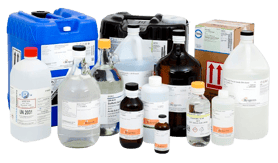Email us : scientific@sumisons.com. | call us : +91 7358100740 | +91 9940240809

The Top 5 Essential Lab Chemicals Every Research Facility Should Stock
Introduction
In any research facility, efficient and successful experimentation relies heavily on having the right tools and materials. Among these, chemical reagents play a crucial role in a wide array of procedures. This blog serves as a helpful guide detailing the top five essential lab chemicals that every research facility should have on hand to ensure seamless operations in routine experiments and research projects.
1. Sodium Chloride
Sodium chloride, commonly known as table salt, is not merely a condiment; it is a vital laboratory reagent. It is extensively utilized in biochemical and molecular biology experiments, aiding in the preparation of buffer solutions. Its ability to stabilize proteins and maintain osmotic balance makes it indispensable in various processes, including cell cultivation. Labs must ensure a consistent supply of sodium chloride for optimal experimental integrity.
2. Acetic Acid
Also known as ethanoic acid, acetic acid is an essential solvent commonly used in laboratories. Its importance stems from its role as a pH adjuster in biochemical reactions and its function as a reactant in organic synthesis. Researchers frequently use dilute acetic acid to prepare various biological samples. Keeping a stock of acetic acid is crucial for laboratories aiming to conduct precise pH-dependent experiments efficiently.
3. Ethanol
Ethanol is another indispensable lab chemical with applications ranging from cleaning and sterilization to use as a solvent in various chemical reactions. Its ability to dissolve a wide range of polar and non-polar compounds makes it invaluable in organic chemistry. Laboratories should ensure an adequate supply of ethanol, as it is routinely employed in the preparation of samples for chromatographic techniques and spectroscopic analyses.
4. Hydrogen Peroxide
Hydrogen peroxide is widely recognized for its antibacterial and antiviral properties. In a laboratory setting, it serves both as a disinfectant and an oxidizing agent in chemical reactions. Its efficacy in eliminating contaminants makes it an essential chemical for maintaining sterile conditions in the lab. Regularly stocking hydrogen peroxide can significantly enhance the overall safety and efficacy of laboratory operations.
5. Ammonium Hydroxide
Ammonium hydroxide is a critical laboratory reagent often used in titrations and to prepare buffer solutions. It acts as a cleaning agent and is crucial in various analytical chemistry techniques. Laboratories that focus on ammonia solutions must stock ammonium hydroxide to ensure smooth conduct of experiments. Its versatility in both organic and inorganic chemistry applications underscores its status as a must-have chemical.
Conclusion
Equipping a research facility with these five essential lab chemicals—sodium chloride, acetic acid, ethanol, hydrogen peroxide, and ammonium hydroxide—can significantly streamline experimentation processes. Maintaining a sufficient inventory of these substances will not only enhance the capability of researchers but also promote safety and efficiency in various laboratory procedures. Ultimately, being prepared with the right chemicals lays the groundwork for successful scientific explorations.







